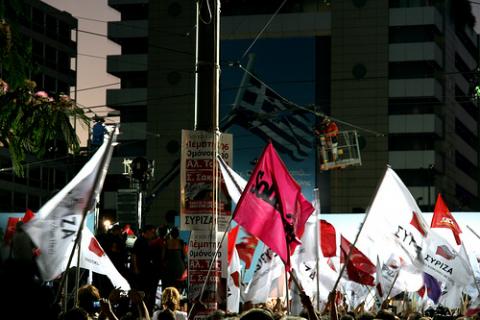A spectre is haunting Europe - The spectre of Syriza

“A spectre is haunting Europe — the spectre of communism. All the powers of old Europe have entered into a holy alliance to exorcise this spectre: Pope and Tsar, Metternich and Guizot, French Radicals and German police-spies”
-Karl Marx, The Communist Manifesto
On 17 June 2012, the Greek electorate will go to the polls to elect a new government for the second time in two months. The choice they face is clear: They can vote for the conservative New Democracy party, representing the bankrupt policy of austerity and submission to the diktats of the Troika, or they can vote for Syriza, who have promised that if they win the polices of austerity will be cast aside and a new era of growth and prosperity will begin on Monday.
‘Secret’ polls circulating in Greece on Friday show that New Democracy had a slight lead over Syriza (30.5% to 29%) but in reality the election is too tight to call. Whatever the outcome, one thing is certain: The prospect of a Syriza victory has sent shivers down the spines of the European political establishment, resulting in a barrage of threats and pleading being directed at the Greek people since the inconclusive election results on 6 May 2012. Angela Merkel, Germany’s centre-right Chancellor and champion of European belt tightening, pleaded again on Saturday morning for Greeks to elect a government that would keep to its agreements with the Troika in spite of the fact that their own projections show that the hated Memorandum is set to shrink the Greek economy by at least another 4.5% this year.
France’s recently elected ‘socialist’ President, François Hollande, threatened on Friday that:
“…if the impression is given that the Greeks want to move away from the commitments that were taken and abandon all prospects of revival, then there will be countries in the eurozone that will want to end the presence of Greece in the Eurozone.”
Hollande’s empty threat (no legal mechanism exists to expel Greece from the Eurozone) merely highlights the growing irrelevance of the parties of the Socialist International (including our own Labour Party and Greece’s PASOK), now little more than the useful fools of international capital, and the prospect of their own decline and defeat embodied in the rise of Syriza.
In the opening lines of the Communist Manifesto, Karl Marx remarked that the European elites’ fear of the spectre of communism revealed that communism was “already acknowledged by all European powers to be itself a power”.
While June 2012 is not October 1917, and Syriza have been criticised by many on the ‘revolutionary’ left for their reformist, stageist approach, the fact that almost a third of the Greek electorate will give their support to a party that rejects the dominant neo-liberal ideology is a revolutionary transformation that the Irish left can currently only dream of.
As the powers of old Europe, centre-right and centre-left, form their unholy alliance to defeat the Greek people’s efforts to shrug off the bankrupt ideology of austerity in Greece, Syriza have managed to lay bare the hypocrisy and deceit at the heart of the old social democratic parties and are giving form to the vision of a new European left rooted in a firm commitment to social justice and the primacy of people over profits.
In the Netherlands, at the core of the Eurozone, almost beneath the radar of the international media, a similar quiet revolution has been taking place and the radical Socialist Party have surged to the top in polls on an anti-austerity/anti-bank bailout platform. They are currently set to become the largest party following elections on the 12 September 2012.
While a similar surge in support for the left has yet to emerge in Ireland, it is clear here too that the old social democratic left represented by Labour has been completely discredited by its willing implementation of ‘Frankfurt’s way’. Polls at the end of May 2012 suggested Labour would win as few as 14 seats if an election were held today. Those who wish to see a radical alteration of Irish society and state can take hope and inspiration from developments in Greece whatever the final outcome of the election. As Slavoj Žižek so eloquently put it in a recent piece for the London Review of Books:
“Greece is not an exception. It is one of the main testing grounds for a new socio-economic model of potentially unlimited application: a depoliticised technocracy in which bankers and other experts are allowed to demolish democracy. By saving Greece from its so-called saviours, we also save Europe itself.”
{jathumbnailoff}
Image top: bluto blutarski.
